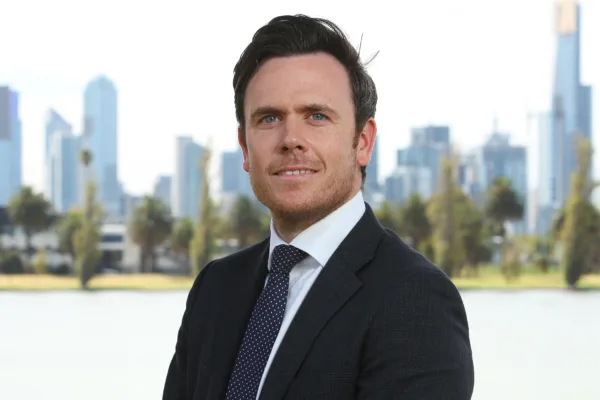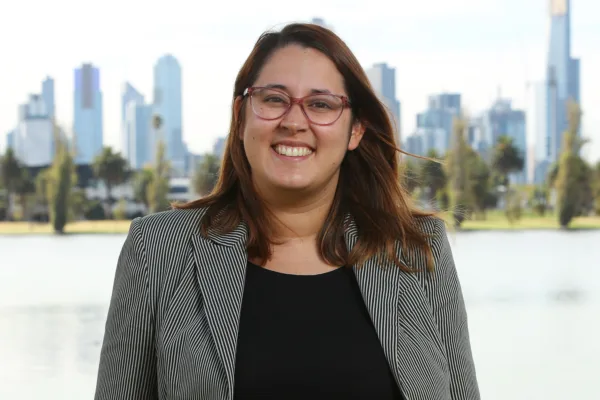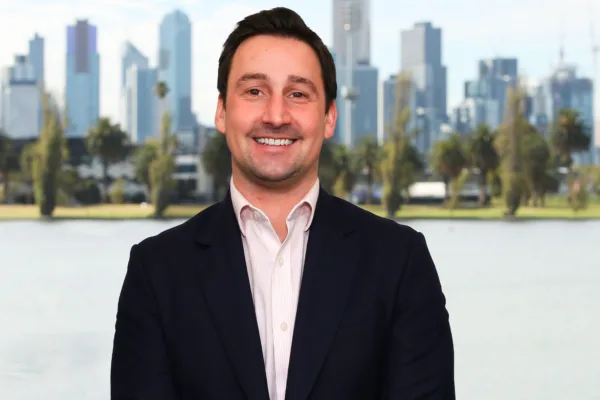Back
The Engine Room: Riley Davie
Thursday, 3 December 2020
As a self-confessed sports nut, Riley knew some form of career in that industry was inevitable.
‘The Engine Room’ aims to build the profile of Australian Grand Prix Corporation (AGPC) staff members and provide interesting insights into what it is like to be part of the team working on two iconic international events, the Formula 1® Australian Grand Prix in Melbourne and the Australian Motorcycle Grand Prix in Phillip Island.
Riley Davie - Sales Operations Manager
1. Having completed a double degree in Sports Management and Business, you’ve always had a keen interest in pursuing a career in sport, what guided your transition into major events?
Growing up as a huge fan of all sports, especially AFL, cricket, soccer, golf and Formula 1®, some form of career in the sports industry was inevitable. Early dreams were mainly focused around which one of those sports I could actually compete in professionally, but when the time came to make decisions in my late teens, a career working in the sports industry was much more viable than a life dedicated to hitting golf shots and living off oversize novelty pay cheques (like those ones Happy Gilmore kept in the back of his car)!
I studied a full-time double degree in Sports Management and Business Management at the University of Ballarat, where I grew up. Due to the course being so broad in its content, it enabled me to learn many different aspects of the sporting industry from facility management, law in sport, finances, many different marketing areas (as it was my major), and of course, event management. The event management subjects were my favourite, and the subjects in which I got my best marks. This is due to the amazing like-minded students I had around me, and the background from which I came from.
Growing up I always had a keen passion for planning my own sporting events, whether that be with friends or just by myself in the backyard where I was Head of Operations, Chief Groundsman, Statistician and Australian Cricket Selector all in the one role! I’ve always had a strong attention to detail, and receive great satisfaction when planning anything, seeing the final outcome come to fruition after what can be weeks, months and even years of a hard work and preparation. It was these pre-requisites, along with some event volunteering throughout my time at university that lead me down the path of seeking a position in major events, which I find myself in today.
All roles I have held prior to working in major events at the Australian Grand Prix Corporation (AGPC) have each had elements of event planning and execution, and similar to the event management subjects I studied at university, these were the areas of my jobs in which I both enjoyed, and excelled at the most. From the meticulous detail required in my position at Cricket Victoria assisting with the production of the Victorian Cricket Census, to the delivery of daily competitions at the Metropolitan Golf Club, all positions have required skillsets very relatable to the major events industry, and those skills are luckily very transferrable to what I do today, and have held me in good stead since my commencement at the AGPC two and a half years ago.
2. What have been the biggest challenges you’ve faced in your career?
There’s been many different challenges I’ve faced over my professional career, but the biggest challenge I have faced, and continue to face was the decision, or rather, indecision, to move away from home in Ballarat to Melbourne, and the physical separation I now have with my closest family and friends.
A home-body by nature, doing a four-year university course in my home town while still living with my amazingly supportive mother and father was an absolute dream, and if it weren’t for that level of comfort (and home-cooked meals) I may have never made it through university. My initial plan was to defer my university offer, and play golf for a year to see just how far I could rise up through the ranks, but a last-minute decision one week before the first semester of university began saw me enrolled and ready to learn that year.
My first two years of university were a challenge, as I had many second thoughts about the path I had chosen, but sticking it out and completing my course was one of the best decisions I have ever made, as I really began to hit my strides in my third and fourth year. During this time, I started thinking and acting like the professionals in the sports industry that I looked up to so much. I was managing my time efficiently, becoming more well-spoken, and thinking more critically and analytically than I ever had before,
In my last semester of university, I was lucky enough to be selected for an internship at Cricket Victoria. Here I learnt the importance of thoroughness in my work, and the attention to detail required to manage large sets of participation data, not to mention the intricacies of planning a large scale event, the T20 Blast State Final & Semi Finals at the MCG.
Fortunately, this position was in Jolimont right next to the MCG, so it was an easy daily commute to-and-from Ballarat. As a self-confessed sports nut, it was also pretty incredible to see the amazing stadium every morning! However, upon completion of that internship I was left at somewhat of a crossroads. Should I return to Ballarat to work in a local sporting role? Do I pursue something else in Melbourne? Do I travel overseas? All of these questions left me quite overwhelmed.
An aspiring golfer, I found my dream job at the Metropolitan Golf Club in Melbourne, however, I was still commuting approximately four hours in total every day. After a rewarding year at the golf club, I applied for a job at AGPC and after my first six months (still commuting back and forth from Ballarat), I finally decided I needed to settle in Melbourne for this great role, and I have now been based in Melbourne for the past two years (with a nice eight months back home due to COVID this year).
The separation from my closest family and friends is still the biggest challenge I face in my career but I’m lucky that I’m surrounded by a new bunch of best friends at the AGPC, and of course have frequent visits back to Ballarat on weekends to see family and friends.
3. An advocate for continuous learning, has there been any defining experiences that have helped to shape your professional and personal outlook?
There have been many valuable and pivotal learning experiences over my years, but one that really stands out was a three-day training course hosted by Kirk Peterson from Performance Shift in 2018.
During my time at AGPC, one of the many things the corporation has been sensational at is providing great training sessions to further our learning, and the Kirk Peterson course has become an opportunity for all new staff members at AGPC to foster self-awareness and peak performance.
This training came at a very transitional time for me. I was six months into my time at AGPC, having just worked my first MotoGP™ event down at Phillip Island in October. In addition to this, my manager had just resigned as he was moving back to New Zealand, and simultaneously I was trying to convince myself to make the big move down to Melbourne to live permanently. This training with Kirk opened my eyes on ways to manage my own emotions and become more self-aware, how to be more resilient, and provided me with techniques to normalise myself and my behaviours at a higher level both professionally and personally.
This training allowed me to realise what was truly important to me, and really simplified what was then (and still is) a crazy world. On the back of this training, I made the move to Melbourne in November, was promoted into my manager’s position in January of the new year and worked my first Formula 1® Australian Grand Prix event. To cap off what was one of my most successful, but still challenging years of my life, I was the receipient of third place in the AGPC’s Mariyana Burela awards for employee of the year. Kirk’s training had set the platform for this success and enabled me to realise what was required to not only survive but thrive in this industry.
As I continue on my learning journey at AGPC, I remain a big advocate for diversifying my skillset, particularly in areas which I am passionate about such as sustainability. I have recently joined the AGPC Green Prix team, which focuses on the sustainable direction of our two events. Through this group, I have been lucky enough to attend a summit hosted by the Sports Environment Alliance, attend a meeting with the global Formula 1® organisers about their direction in the sustainability space, as well as sponge off the other likeminded individuals within our own business, which I hope paves the way to becoming a more sustainable sport.
In addition to all of the above, I’m also very lucky to have an older sister who is a Buddhist Nun, so she is a wonderful person to lean on for advice, and to discuss all things to do with mindfulness and how to truly find happiness.
4. As a Sales Operations Manager at AGPC, your role requires plenty of cross-departmental collaboration, what is the key to streamlining the flow of information and data?
I’m in a tremendously exciting position as the Sales Operations Manager at the AGPC, as I have many different touch points with all facets of the business, from Marketing, Finance, Infrastructure, Ticketing, and more. There aren’t many people in the business I don’t need to collaborate with in the lead up to our events, and it’s this cross-departmental collaboration I see as a truly important factor to the flow of information and data.
Not working from the office during the pandemic has obviously made this collaboration more difficult than ever, but realising that early in the piece, all staff at AGPC have made a concerted effort to ensure information is being streamlined to all employees that need to be across certain things.
Attention to detail is also a very important key when streamlining the flow of information and data, not only the attention to detail to the work itself, but also by the way it is delivered as well, ensuring empathy and understanding is shown towards others and how they each individually consume information.
It’s been a unique experience planning our event in a pandemic in the midst of so much uncertainty, but I truly believe this coming event in March is shaping up to be the absolute best it can be under the conditions, and this is thanks to the amazing effort of all staff through the WFH period, where cross-departmental collaboration, and attention to detail have been at an all-time high, despite the circumstances.
As we filter back into the office over the coming weeks and months I believe we, as a business, will be a lot more resilient and much better equipped to handle difficult situations off the back of what has been a challenging experience. While it was initially tricky, I believe working from home has also led to implementing new and efficient processes and challenged any comfort zone we may have grown accustomed to.
Since the cancellation of the Formula 1 event in March of this year, the Sales Operations team has been comprehensively reviewing our operating processes to ensure a ‘best for business’ approach. This is inclusive of areas such as our finances and budgeting, the way in which we manage our CRM database, our ticketing processes and integration with the Ticketmaster platform, and how to best assist the sales team to sell at a greater efficiency, to ultimately create a seamless, smooth and enjoyable customer journey.
5. You’re passionate about mental well-being and driving a positive culture in the workplace, what motivates you to do your best work and what advice do you have for others?
My most passionate area is the happiness and well-being of those close around me, and its working around those same people that motivates me to do my best work too. People’s moods and attitudes are infectious and the best way you can encourage a strong mood to those around you is to treat them in the way in which you would like to be treated. Whether that be in a team setting, amongst your friends or family, or just with the person that’s taking your coffee order each morning. It may sound cliche, but if you really think about it and change your behaviour accordingly, you can make a hugely positive difference to people’s day.
Sometimes things get tough, but there is always one thing you can manage, and this is your mindset and attitude towards certain situations. Just because a certain situation is supposed to make you angry, that doesn’t mean that you have to react negatively to that situation. You need to recognise why it made you feel the way it did, and course correct the things that you can control to stop that negative feeling.
A saying we have at the AGPC is to ‘control the controllables’ (one of the many gems from Kirk’s training). Learning to let go of the things you don’t have immediate control of is one of the most relieving and invigorating things you will ever experience, and it will lift the weight of all those negative emotions associated with trying to control something you have absolutely no say in (e.g. how many daily cases of COVID-19 there are, or how poorly the West Coast Eagles are playing). You have no control over the situation, so why let it control your own, and therefore others emotions?
My advice for others would be to find a mindset and attitude that works for you, whilst simultaneously acknowledging how this mindset and attitude affects the others around you. Doing this will enhance your self-awareness and enable you to realise what is truly important to you in life, and once you realise that, you will begin to operate much more efficiently in your professional life, and also with your family and friends close to you.
The last piece of advice is perhaps the most important, and that is to not be afraid to be vulnerable with those around you that you trust. Reach out to these people for help and offer help unto them as well. We’re all human, we all face difficulties, and we’re all here to support and learn from one another.




